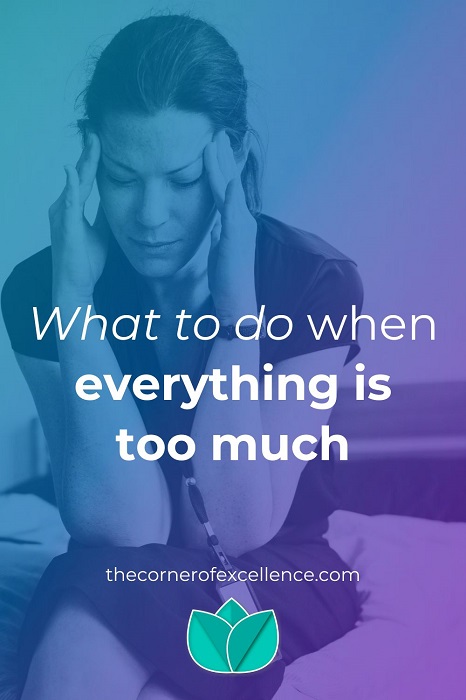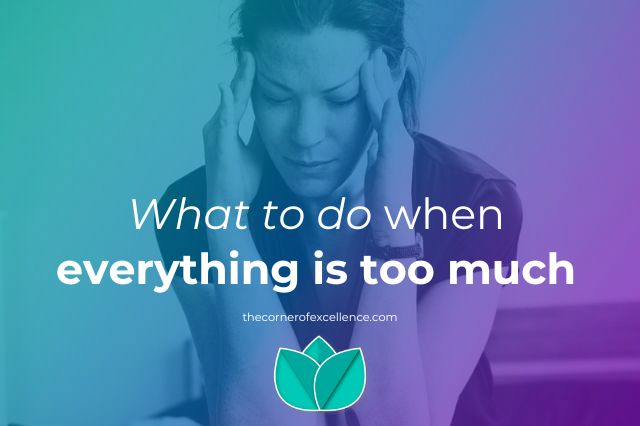Do you feel like everything is too much? Things take a lot of effort. You feel exhausted easily or often. You seem to have a hard time thinking clearly.
Let us see on the one hand what the possible reasons and causes may be. On the other hand, I leave you some suggestions to regain control, energy and vitality and, with that, creativity and productivity.
Symptoms that everything is too much
First we are going to review some sensations and the possible causes. Maybe it happens to you from time to time. Or maybe you have been feeling this way for a while. Let us delve into the feeling that “everything is too much.”
You feel overwhelmed
Perhaps you feel that your situation is too much, that the circumstances exceed you. You feel overloaded with work, responsibilities or obligations. You may feel exhausted just thinking about it all. Sometimes you may feel like running away, hiding or closing your eyes wishing everything would disappear.
You feel exhausted
You may find that you tire easily. Any physical or mental effort seems too much to you. Work, domestic responsibilities, or social relationships drain you.
Maybe you already wake up tired in the morning. Even if you have had enough sleep, you do not seem to have regained your strength.
You have a hard time thinking
You have the feeling of not being able to think clearly. It is hard for you to organise your thoughts. Tasks that require thinking are difficult and exhausting. You feel like you lack inspiration.
It is hard for you to be productive
You find it difficult to progress with important tasks. You keep up appearances at work by getting done just about enough. In other words, you perform the tasks that outwardly give the impression that you are performing. But deep down you know that you should contribute more. However, you lack inspiration, motivation, or mental energy.

Causes for the feeling that everything is too much
All the symptoms and sensations that we have seen may have a common cause. But there may also be several reasons for what you feel. Let us go over the possible causes and reasons.
Medical causes
If you know that you used to have more energy, exhaust yourself less, and be more productive, but you have not seemed yourself for a while, there may be a medical reason. Depression, hormonal imbalance, thyroid problems, anemia, migraines, diabetes, autoimmune diseases, and fibromyalgia are some conditions that can cause fatigue.
Certain medications can also have this side effect. Likewise, allergy or intolerance to certain foods as well as the lack of certain vitamins, such as vitamin B12 or vitamin D, can contribute to the feeling of exhaustion.
Lack of sleep or not sleeping well can also exhaust us. Finally, suffering from constant stress drains us physically, mentally and emotionally.
You have too much on your mind
Be it worries, obligations, tasks etc .; you have too much on your mind. It seems that your mind does not stand still. But they are not creative or productive thoughts. It is all you need to do; everything you should do; the things that you would like to do but for whatever reason you cannot; things that worry you.
You feel like a drifting boat
Maybe you have the feeling that life is passing by. Time flies by even if nothing remarkable happens. You face things as they arise, be it at work or in your private life.
You live the groundhog day
You have the feeling that each day is similar to the one before. You get up, take a shower, eat breakfast, work, have lunch, work, have dinner, sleep. At least you have the feeling that not much more is happening than that.
What to do when everything is too much
Having seen the possible reasons, let us see what you can do to get out of the pit. Often, it is not just a matter of fixing only one thing. You should probably review your habits, the way you organise yourself and how you deal with different situations.
Review the medical causes
First of all, I recommend that you rule out possible medical causes. Talk to your doctor for tests and to get treatment if you have a medical condition.
By achieving certainty in this regard, you will already gain a lot. Whether something happens to you or not, you will then be better able to tackle the following proposals.
Clear your mind
If you have too many things on your mind, it helps to write them down. If you tend to keep your tasks and errands in your head, I suggest you start using a to-do list. This not only helps to unload your mind. It also serves to gain perspective and be able to better decide the importance of each task and in what order to tackle them. Furthermore it helps you decide which tasks you should rather delegate or which ones eliminate.
If you tend to mull over thoughts, concerns, or how you feel, I suggest you start a journal. Take a little time each day to write down what is on your mind.
Finally, control your information consumption. Today we receive multiple stimuli every day from television, internet, social media, email, radio, etc. So much information can overload us on a mental and sensory level. That is why I suggest that you review what you consume each day and be selective so that it contributes to your knowledge or well-being.
Create structure
How do you organise yourself? Do you have plans and projects? Without an organisation and planning system, it is easy to fall into procrastination or mental overload as well as reactively facing what comes up.
The first thing is to be clear about your priorities. Time is limited and only this way you will be able to keep in sight what is important and focus on it.
The second thing is to use a calendar to record appointments, meetings and other dates, both on work and personal level. Third, choose a system for your tasks and errands. Whether on paper or digitally, writing down your tasks clears your mind and helps you decide better what to tackle in which order.
The same goes for plans and projects. Working with a project plan or project management application will help you maintain a global vision, clarify the steps, what is pending and what the milestones are.
If you find it difficult to take time to take care of yourself or have fun, I suggest that you use your calendar and your to-do list to plan leisure and self-care activities.
All this will help you stay in control, dedicate your efforts to what is important and be proactive.

Take care of yourself
To regain energy it is essential that you take care of your body and mind. First, that means trying to eat a healthy and balanced diet to provide your body with the necessary nutrients and vitamins.
Second, even if you feel lazy or do not think you have time, you need to actively move at least 30 minutes a day. Take time for different activities throughout the week such as walking, running, or practicing any other sport that you enjoy.
Third, try to get natural light and the sun. It helps produce vitamin D, raises your spirits and oxygenates you.
Fourth and very important, take care of your night’s rest. Sleeping enough hours and also sleeping well is essential for the proper functioning of your body and mind and for them to recover from the efforts of the day.
Fifth, unresolved problems, worries, and stress greatly affect our productivity. For this reason, I suggest that you take time to write down what concerns you. Then ponder if you can do something about it and if so, what. There are two options: take action or accept it as it is. As for stress, in addition to reducing stressors, try to include stress-relief activities in your routine.
Look for social interaction
The human being is a social animal. So, consider whether you are having enough interpersonal relationships. Interactions with loved ones are as important as the variety of having contact with co-workers and other acquaintances. Contact in person is also much more effective than relating through a screen or social media.
Human contact is not only important on an emotional level, it also helps you think better and be more creative.
Look for variety
The feeling that everything is too much can also be due to too much routine and a lack of inspiring activities. You have a hard time being productive and creative because you are bored. Procrastination leads to the accumulation of tasks and then you have an even harder time to cope with the load. That is why I suggest that you try to include in your day to day at least one activity that you enjoy and makes you forget the routine.
When you go out for a walk or run, choose different routes. Throughout the week choose different sports or exercises to keep in shape. Vary what you eat and learn new recipes. Think about what you would like to learn and dedicate several times during the week to learning. Plan a variety of leisure activities. There are a lot of things you can do to get out of the rut, broaden your horizons and introduce variety into your day-to-day life.
Do you feel like everything is too much?
Does it sometimes seem like everything is too much? After reading the post, what do you think is the reason? What are you planning to do to get out of the situation and regain control and energy?

Sharing is caring!




